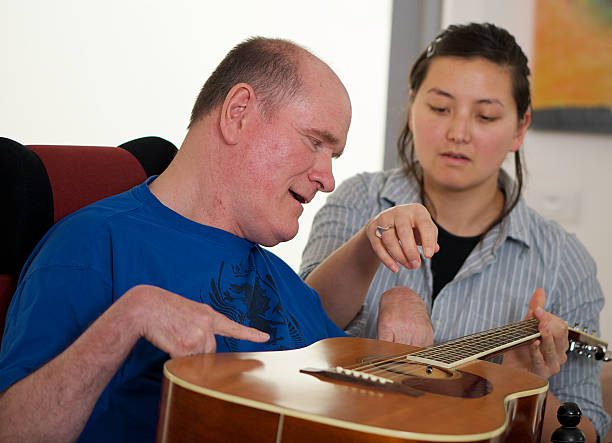
| Music Therapist Key Stats | |
|---|---|
| Education | 3-4 Years |
| Job Outlook | 7% |
Music Therapist professionals work in a variety of health facilities to provide therapeutic relief to patients diagnosed with an illness or disease.
A Music Therapist’s goal is to help rehabilitate a patient by using a musical treatment program.
This type of therapy uses the healing effects of music and is geared to improve the emotional, physical, mental and spiritual facets of a patient’s life and health.
Music therapy is extremely helpful in treating the physiological and psychological aspects of a diagnosis.
This type of therapy can be used with a variety of patients.
Some patients can be young children or elderly adults who have served in the armed forces.
The types of disorders and ailments a Music Therapist helps treat also vary ranging from psychological, developmental, physical, substance abuse and handicap disorders.
Music Therapists perform their healing services in several types of health facilities including: correctional institutions, state mental health hospitals, youth residential facilities, veteran hospitals or schools for the deaf and blind.
Someone who wants to become a Music Therapist must not only have a passion for music, they must apply their talents and passion to help their patients.
Candidates should also have an interest in interacting with a wide range of people who are dealing with a diagnosis.
These professionals may also work in a community setting and require innate people skills.
Table of Contents
Education Requirements to Become a Music Therapist
In addition to having an affinity for melodies and songs, a candidate who wants to become a Music Therapist must fulfill a unique set of requirements in order to provide their talent and skills in this field.
A majority of Music Therapy professionals are also musicians and are able to perform songs on at least one type of instrument.
Candidates must begin a Bachelor’s program that focuses on Music Therapy in order to be considered for jobs.
Some helpful skills that a candidate should have in order to become a Music Therapist include things that are specific to music.
Candidates must be able to read music scores; they must also have a general background of music theory and be able to direct a band, orchestra or other types of groups.
Music Therapists must also have thorough knowledge of music therapy and its applications.
They must be able to determine the types of therapies that help patients with different conditions.
For example, a qualified Music Therapist would be able to determine the type of treatment a mentally handicapped patient would require versus a patient with a physical condition.
Finally, a qualified Music Therapist will need to learn the different types of equipment that is used in music therapy.
Music Therapist Job Description
Music Therapists use their knowledge of music to implement a treatment plan to help their patients overcome the psychological or physiological aspects of an illness.
They can begin by getting to know their patients and reviewing their medical history.
Using the information they gather, they will then create and organize a treatment plan specialized with the patient’s needs, potential and interests in mind.
A Music Therapist professional will plan a variety of activities using the following techniques: vocal or instrumental music, solo or group singing, music activities or performing in a band.
All the techniques used will depend on the patient and works best for them.
During all activities, a Music Therapist will observe the patient and determine whether the treatment is helping the patient.
For patients who perform activities in a group setting, a Music Therapist will create a general treatment program.
This type of setting will engage patients who are able to work with others.
Music Therapist Salary and Career Path
According to payscale.com, the national salary range for this type of career is $24,644 to $50,844 per year.
In addition, a Music Therapist can expect to move up the ranks as they gain experience in the field.
Candidates who are fresh out of college will begin at the entry level and are regarded as trainees in some facilities.
They will develop their expertise and skills and move into an intermediate level once they show an understanding of music therapy.
The last level includes highly experienced professionals who perform their services that affect the development of their program as a whole.
![]() The below information is based on the 2023 BLS national averages.
The below information is based on the 2023 BLS national averages.
National Average Salary
$96,790Average Salary by State
| State | Avg. Annual Salary |
|---|---|
| Alabama | $94,680 |
| Alaska | $98,960 |
| Arizona | $93,600 |
| Arkansas | $92,680 |
| California | $113,550 |
| Colorado | $104,950 |
| Connecticut | $96,220 |
| Delaware | $94,180 |
| District of Columbia | $100,430 |
| Florida | $92,820 |
| Georgia | $98,490 |
| Hawaii | $99,490 |
| Idaho | $89,550 |
| Illinois | $96,160 |
| Indiana | $88,700 |
| Iowa | $85,790 |
| Kansas | $92,510 |
| Kentucky | $86,860 |
| Louisiana | $93,110 |
| Maine | $80,590 |
| Maryland | $101,710 |
| Massachusetts | $94,340 |
| Michigan | $84,560 |
| Minnesota | $85,840 |
| Mississippi | $90,510 |
| Missouri | $87,970 |
| Montana | $87,380 |
| Nebraska | $87,710 |
| Nevada | $107,070 |
| New Hampshire | $87,690 |
| New Jersey | $105,880 |
| New Mexico | $100,740 |
| New York | $107,530 |
| North Carolina | $88,510 |
| North Dakota | $82,450 |
| Ohio | $89,490 |
| Oklahoma | $97,850 |
| Oregon | $100,910 |
| Pennsylvania | $92,870 |
| Rhode Island | $95,660 |
| South Carolina | $88,520 |
| South Dakota | $81,610 |
| Tennessee | $92,710 |
| Texas | $101,610 |
| Utah | $85,750 |
| Vermont | $86,370 |
| Virginia | $102,550 |
| Washington | $101,780 |
| West Virginia | $87,460 |
| Wisconsin | $85,030 |
| Wyoming | $84,690 |
| Puerto Rico | $47,660 |
The top earning state in the field is California, where the average salary is $113,550.
These are the top 5 highest-paying states in the field:
* Employment conditions in your area may vary.
Frequently Asked Questions
What does a music therapist do?
Music therapists use music to assess their clients’ well-being, communication abilities, and cognitive skills and to improve their quality of life.
Music therapy can help children and adults with mental health issues or developmental and learning disabilities.
Music therapists can find employment in a variety of places, such as psychiatric hospitals, rehabilitative facilities, clinics, hospitals, daycare treatment centers, nursing programs, schools, and correctional facilities.
Most music therapists work full time and some may work evenings and weekends to accommodate their patient’s needs.
As a music therapist, you will need music skills, but also compassion, communication skills, and patience.
How much does a music therapist make?
According to the Bureau of Labor Statistics, the median annual wage of recreational therapists, in general, was $47,860, as of May 2018.
Salaries vary depending on a wide range of factors; some recreational therapists earn less than $30,000, while others make more than $75,000.
How much does it cost to become a music therapist?
In order to become a music therapist, you will need to complete a music therapy college program and afterward, you will have to sit for the national exam offered by the Certification Board of Music Therapists.
Tuition costs for bachelor’s degree programs in music therapy vary widely depending on many factors; costs for a four-year program can be anywhere between less than $40,000 and more than $160,000.
The examination fee for the licensing exam is $325 for first-time exam takers; the reexamination fee is $275.
What is the demand for music therapists?
According to the Bureau of Labor Statistics, the employment of recreational therapists, in general, is expected to grow 7 percent from 2018 to 2028.
As the population grows, more music therapists will be needed to help patients in hospitals, hospices or daycare treatment centers.
In order to have the best job prospects, you will need some experience in the field and a bachelor’s degree from a reputable institution.
Some colleges also offer students the possibility of participating in internships, thus helping them gain practical experience in the field.
How long does it take to become a music therapist?
As a music therapist, you will need to complete a four-year bachelor’s degree program and to get your state license.
As a music therapy student, you will usually learn the theory and practice of music therapy, techniques in music therapy, the psychological foundations of music, child development and about the influence the music has on behavior.
Most programs also offer internships in music therapy.
In order to take the exam offered by the Certification Board of Music Therapists, you must first complete an academic and clinical training program approved by the American Music Therapy Association.
The certification exam can be taken by appointment; you can apply at any time if you meet the licensing criteria.
After getting your certification you will be ready to practice.
Music therapists have to take the recertification exam every 5 years.












